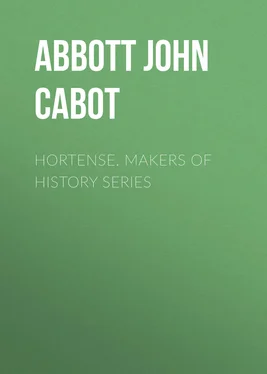John Abbott - Hortense. Makers of History Series
Здесь есть возможность читать онлайн «John Abbott - Hortense. Makers of History Series» — ознакомительный отрывок электронной книги совершенно бесплатно, а после прочтения отрывка купить полную версию. В некоторых случаях можно слушать аудио, скачать через торрент в формате fb2 и присутствует краткое содержание. Жанр: Биографии и Мемуары, История, foreign_edu, foreign_antique, foreign_prose, на английском языке. Описание произведения, (предисловие) а так же отзывы посетителей доступны на портале библиотеки ЛибКат.
- Название:Hortense. Makers of History Series
- Автор:
- Жанр:
- Год:неизвестен
- ISBN:нет данных
- Рейтинг книги:4 / 5. Голосов: 1
-
Избранное:Добавить в избранное
- Отзывы:
-
Ваша оценка:
- 80
- 1
- 2
- 3
- 4
- 5
Hortense. Makers of History Series: краткое содержание, описание и аннотация
Предлагаем к чтению аннотацию, описание, краткое содержание или предисловие (зависит от того, что написал сам автор книги «Hortense. Makers of History Series»). Если вы не нашли необходимую информацию о книге — напишите в комментариях, мы постараемся отыскать её.
Hortense. Makers of History Series — читать онлайн ознакомительный отрывок
Ниже представлен текст книги, разбитый по страницам. Система сохранения места последней прочитанной страницы, позволяет с удобством читать онлайн бесплатно книгу «Hortense. Makers of History Series», без необходимости каждый раз заново искать на чём Вы остановились. Поставьте закладку, и сможете в любой момент перейти на страницу, на которой закончили чтение.
Интервал:
Закладка:
Napoleon at the Tuileries.
Napoleon remained but two months in the palace of the Luxembourg. In the mean time the palace of the Tuileries, which had been sacked by revolutionary mobs, was re-furnished with much splendor. In February the Court of the Consuls was transferred to the Tuileries. Napoleon had so entirely eclipsed his colleagues that he alone was thought of by the Parisian populace. The royal apartments were prepared for Napoleon. The more humble apartments, in the Pavilion of Flora, were assigned to the two other consuls. The transfer from the Luxembourg was made with great pomp, in one of those brilliant parades which ever delight the eyes of the Parisians. Six thousand picked soldiers, with a gorgeous train of officers, formed his escort. Twenty thousand troops with all the concomitants of military parade, lined the streets. A throng, from city and country, which could not be numbered, gazed upon the scene. Napoleon took his seat in a magnificent carriage drawn by six beautiful white horses. The suite of rooms assigned to Josephine consisted of two large parlors furnished with regal splendor, and several adjoining private rooms. Here Hortense, a beautiful girl of about eighteen, found herself at home in the apartments of the ancient kings of France.
Beauty of Josephine.
In the evening a brilliant assembly was gathered in the saloons of Josephine. As she entered, with queenly grace, leaning upon the arm of Talleyrand, a murmur of admiration rose from the whole multitude. She wore a robe of white muslin. Her hair fell in ringlets upon her neck and shoulders, through which gleamed a necklace of priceless pearls. The festivities were protracted until a late hour in the morning. It was said that Josephine gained a social victory that evening, corresponding with that which Napoleon had gained in the pageant of the day. In these scenes Hortense shone with great brilliance. She was young, beautiful, graceful, amiable, witty, and very highly accomplished. In addition to this, she was the stepdaughter of the First Consul, who was ascending in a career of grandeur which was to terminate no one could tell where.
Malmaison.
During Napoleon's absence in Egypt Josephine had purchased the beautiful estate of Malmaison. This was their favorite home. The chateau was a very convenient, attractive, but not very spacious rural edifice, surrounded with extensive grounds, ornamented with lawns, shrubbery, and forest-trees. With the Tuileries for her city residence, Malmaison for her rural retreat, Napoleon for her father, Josephine for her mother, Eugene for her brother; with the richest endowments of person, mind, and heart, with glowing health, and surrounded by admirers, Hortense seemed now to be placed upon the very highest pinnacle of earthly happiness.
Josephine and Hortense resided at Malmaison when Napoleon made his ten months' campaign into Italy, which was terminated by the victory of Marengo. They both busily employed their time in making those improvements on the place which would create a pleasant surprise for Napoleon on his return. Here they opened a new path through the forest; here they spanned a stream with a beautiful rustic bridge; upon a gentle eminence a pavilion rose; and new parterres of flowers gladdened the eye. Every charm was thrown around the place which the genius and taste of Josephine and Hortense could suggest. At midnight, on the second of July, Napoleon returned to Paris, and immediately hastened to the arms of his wife and daughter at Malmaison. He was so pleased with its retirement and rural beauty that, forgetting the splendors of Fontainebleau and Saint Cloud, he ever after made it his favorite residence. Fortunate is the tourist who can obtain permission to saunter through those lovely walks, where the father, the wife, and the daughter, for a few brief months, walked almost daily, arm in arm, in the enjoyment of nearly all the happiness which they were destined on earth to share. The Emperor, at the close of his career, said upon his dying bed at St. Helena,
Remarkable testimony of Napoleon.
"I am indebted for all the little happiness I have enjoyed on earth to the love of Josephine."
Hortense and her mother frequently rode on horseback, both being very graceful riders, and very fond of that recreation. At moments when Napoleon could unbend from the cares of state, the family amused themselves, with such guests as were present, in the game of "prisoners" on the lawn. For several years this continued to be the favorite pastime at Malmaison. Kings and queens were often seen among the pursuers and the pursued on the green sward.
It was observed that Napoleon was always solicitous to have Josephine on his side. And whenever, in the progress of the game, she was taken prisoner, he was nervously anxious until she was rescued. Napoleon, who had almost lived upon horseback, was a poor runner, and would often, in his eagerness, fall, rolling head-long over the grass, raising shouts of laughter. Josephine and Hortense were as agile as they were graceful.
The infernal machine.
On the 24th of December, 1800, Napoleon, Josephine, and Hortense were going to the opera, to hear Haydn's Oratorio of the Creation. It was then to be performed for the first time. Napoleon, busily engaged in business, went reluctantly at the earnest solicitation of Josephine. Three gentlemen rode with Napoleon in his carriage. Josephine, with Hortense and other friends, followed in her private carriage. As the carriages were passing through the narrow street of St. Nicaire, a tremendous explosion took place, which was heard all over Paris. An infernal machine, of immense power, had been conveyed to the spot, concealed beneath a cart, which was intended, at whatever sacrifice of the lives of others, to render the assassination of the First Consul certain. Eight persons were instantly killed; more than sixty were wounded. Several buildings were nearly demolished. The windows of both carriages were dashed in, and the shattered vehicles were tossed to and fro like ships in a storm. Napoleon almost miraculously escaped unharmed. Hortense was slightly wounded by the broken glass. Still they all heroically went on to the opera, where, in view of their providential escape, they were received with thunders of applause.
The royalist conspiracy.
It was at first supposed that the Jacobins were the authors of this infamous plot. It was afterwards proved to be a conspiracy of the Royalists. Josephine, whose husband had bled beneath the slide of the guillotine, and who had narrowly escaped the axe herself, with characteristic humanity forgot the peril to which she and her friends had been exposed, in sympathy for those who were to suffer for the crime. The criminals were numerous. They were the nobles with whom Josephine had formerly lived in terms of closest intimacy. She wrote to Fouché, the Minister of Police, in behalf of these families about to be plunged into woe by the merited punishment of the conspirators. This letter reflects such light upon the character of Josephine, which character she transmitted to Hortense, that it claims insertion here.
Letter from Josephine.
"Citizen Minister,—While I yet tremble at the frightful event which has just occurred, I am disquieted and distressed through fear of the punishment necessarily to be inflicted on the guilty, who belong, it is said, to families with whom I once lived in habits of intercourse. I shall be solicited by mothers, sisters, and disconsolate wives, and my heart will be broken through my inability to obtain all the mercy for which I would plead.
"I know that the clemency of the First Consul is great; his attachment to me extreme. But the crime is too dreadful that a terrible example should not be necessary. The chief of the Government has not been alone exposed. It is that which will render him severe, inflexible. I conjure you, therefore, to do all in your power to prevent inquiries being pushed too far. Do not detect all those persons who may have been accomplices in these odious transactions. Let not France, so long overwhelmed in consternation by public executions, groan anew beneath such inflictions. It is even better to endeavor to soothe the public mind than to exasperate men by fresh terrors. In short, when the ringleaders of this nefarious attempt shall have been secured, let severity give place to pity for inferior agents, seduced, as they may have been, by dangerous falsehoods or exaggerated opinions.
Читать дальшеИнтервал:
Закладка:
Похожие книги на «Hortense. Makers of History Series»
Представляем Вашему вниманию похожие книги на «Hortense. Makers of History Series» списком для выбора. Мы отобрали схожую по названию и смыслу литературу в надежде предоставить читателям больше вариантов отыскать новые, интересные, ещё непрочитанные произведения.
Обсуждение, отзывы о книге «Hortense. Makers of History Series» и просто собственные мнения читателей. Оставьте ваши комментарии, напишите, что Вы думаете о произведении, его смысле или главных героях. Укажите что конкретно понравилось, а что нет, и почему Вы так считаете.












